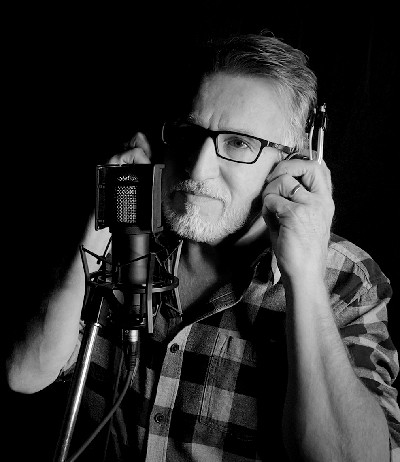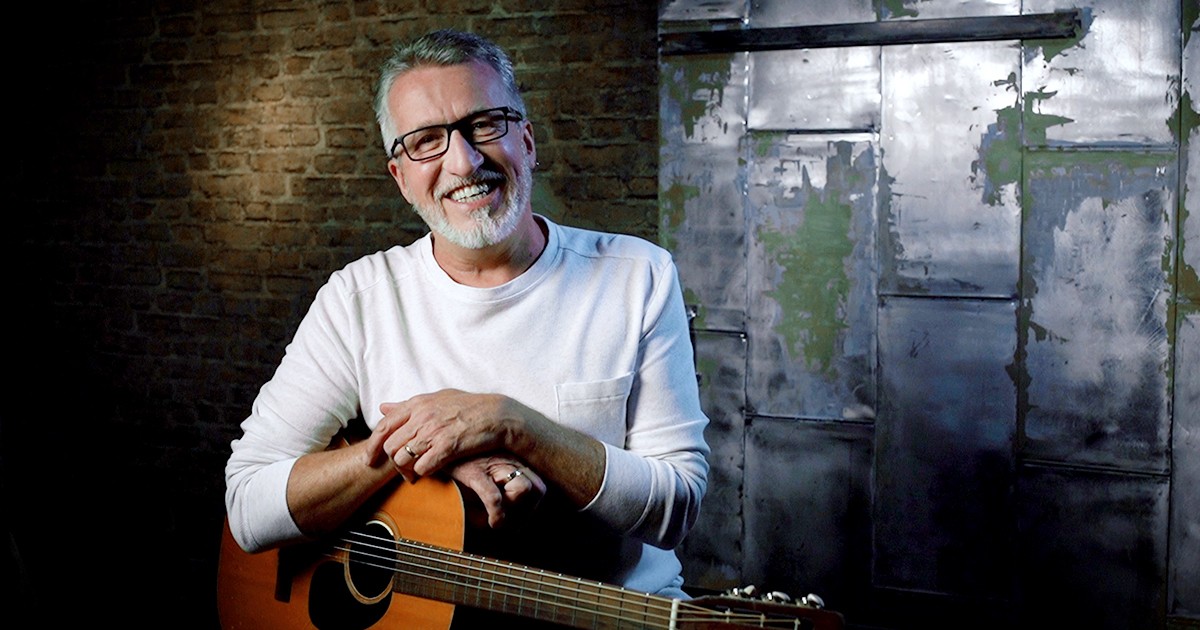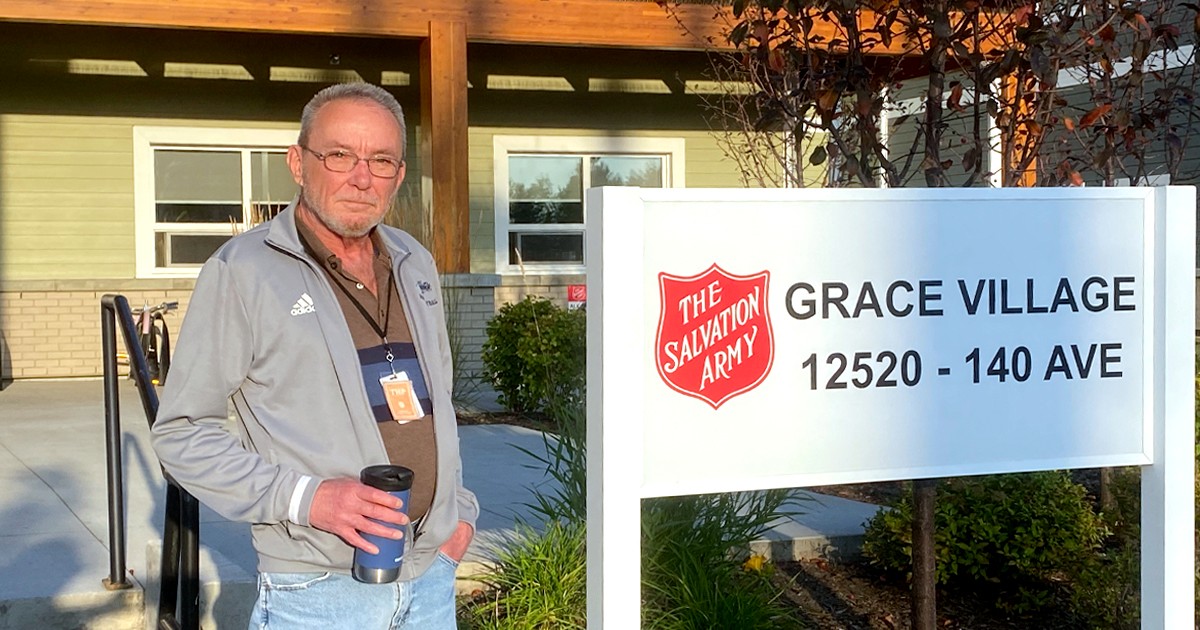He’s been called “a resolute Christian pilgrim; a spiritual sommelier; a ‘deeper-life’ troubadour” by award-winning film producer Jim Van Eerden, and the description is apt. Singer-songwriter and guitarist Steve Bell is one of the best-known Christian musicians in Canada. Among his many awards in his 35-year career are two Junos and the Queen Elizabeth II Diamond Jubilee Medal.
“I’ve just let the songs come,” Steve says.“I recorded them, and I go sing them wherever people want to hear them, and that has seemed to be enough.”
Transcending and supplementing his music—23 albums and counting—is Steve’s commitment to advocacy, which has raised significant support for organizations such as World Vision, Canadian Foodgrains Bank and Compassion Canada.
Faith & Friends interviewed Steve in Winnipeg.

You are a member of the Order of Canada. Can you tell us about that?
Yes, my name was announced in December 2022, along with the names of other appointees. The investiture took place at Rideau Hall last December, and I had lunch with the Governor General, the Honourable Mary Simon. That was wonderful because she’s Canada’s first Indigenous Governor General. That’s meaningful for me having been a small part of some Indigenous justice efforts.
I see the award not so much as a recognition of the work I’ve done, but more for what they hope I will continueto do in the future, to contribute with my art and my efforts to the betterment of Canada. And that’s just fine with me!
What is the song that you’re the proudest of?
I wrote a song in 1994 called Burning Ember in response to the writings of a Russian Orthodox priest in the late 19th century, Father John of Kronstadt. He wrote about the fundamental dignity of the human being, who he said is like a piece of iron that, if you put it in a fire, has the capacity to take on the qualities of fire, heat, light. And if you leave it there long enough, it’ll turn white hot. The iron, even though the energy of fire is foreign to it, will take it and hold it. You can burn with it, you can probably start another fire with it, but if you put it out, it turns back to cold metal.
His message was to lay our life in the fire of God’s divine love in order to become by grace what God is by nature. Anything less is beneath our dignity.
When I sat back and looked objectively at Burning Ember, I realized that the song was wiser than I was. The song knew more than I did. I’m constantly going back and seeing something new in it that I didn’t know was there before. I’m really not writing songs anymore to try to tell you what I think or what I know. Songwriting for me now is a process of discovery, and how I wring a bit of truth or goodness or beauty out of it.
That song fundamentally changed how I think about songwriting.
How has songwriting deepened your faith?
Ronald Rolheiser is a Catholic priest and theologian who wrote a book called Holy Longing. I was at a Henri Nouwen Society conference years ago in Toronto, and he was a keynote speaker; I was just sort of “the singer guy.”
He said the difference between Nouwen’s writing on spirituality compared to everyone else’s is that most people are writing about spirituality while Nouwen’s writing is spirituality. He said it’s not pointed to anything. It is the thing.
I realized that songwriting was like that for me. It is how I pray. It’s how I think and how I learn. When I sing my songs, I’m actually letting you in on my personal prayer diary.
Have you had any interactions with The Salvation Army?
My wife graduated from Booth University College in Winnipeg with a degree in social work.
Over the years, I have performed at their chapel. My wife wanted to retire from teaching, but she wanted to get into social work. One morning, I was performing at Booth and my wife was with me. We didn’t even know there was a social-work program at Booth. As I was setting up, a faculty member asked if my wife wanted a tour. When the woman realized Nanci was interested in social work, she told her all about it. Within a few months, Nanci had enrolled.

What do you think of The Salvation Army?
Growing up, my dad was a prison chaplain at Manitoba’s Stony Mountain Institution and Salvation Army folk would come in for services or to help out, so I was constantly exposed to their work.
But my earliest recollection was as a little boy. My father was the pastor of a Baptist church in Drumheller, Alta. My parents were best friends with some Salvation Army pastors. I was intrigued by the uniforms and how different their church was to ours. I’m not putting down my church, but there really was no effort to address ongoing community needs. For the Army, though, that seemed to be the core of who they were. I was impressed by that.
Who are your musical influences?
If I had to choose one name, it’d be Bruce Cockburn. He’s the guy. I saw him in 1978 when I was 18. I grew up in a Baptist fundamentalist-lite culture from the Prairies where musicians had to give an altar call, had to mention very specific sins they warned against, had to quote Scripture, things like that.
And here comes this guy who did none of that. He talked about social justice issues, which Ididn’t know were the concernof a Christian. His scope of Christian concern just rocked my world.
Then there was his attention to detail and the beauty of his guitar playing. For most of us who grew up in youth groups, we played a couple of chords and sang. When I saw him, I thought, There’s a ministry in that. Excellence and artistry communicate something that words never will.
Where do you see yourself in a year? In five years? In 10 years?
Well, that’s a really pertinent question for me now. This year, I’ll be an official senior, and so I’m starting to ask questions.
How do I take the work I’ve done, the songs God has given me, the ministry I’ve built, the social capital I have, and how do I walk that into this next stage of life? How do I be a prayerful, non-anxious presence, but also at the same time speak the truth and use the gifts God has given me to woo people to a more Christian way of living?
These are the questions I need to be thinking about in the next four or five years if I’m going to continue into my 70s, which I think I can do. There’s nothing in me that wants to retire!










Thanks for this interview with Steve Bell. Bell is a personal favourite. His songs are always thoughtful. They make room for joy, sorrow, and the complexities that come with following Jesus. What's more, he's a faithful, active Christian who uses his gifts to benefit people who are vulnerable. Thanks for highlighting this connection with the mission, vision, and values of The Salvation Army.